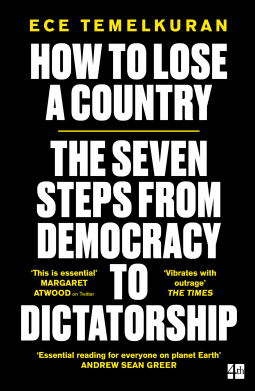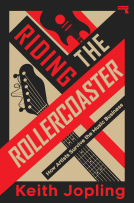
How to Lose a Country
The 7 Steps from Democracy to Dictatorship
by Ece Temelkuran
This title was previously available on NetGalley and is now archived.
Send NetGalley books directly to your Kindle or Kindle app
1
To read on a Kindle or Kindle app, please add kindle@netgalley.com as an approved email address to receive files in your Amazon account. Click here for step-by-step instructions.
2
Also find your Kindle email address within your Amazon account, and enter it here.
Pub Date 7 Feb 2019 | Archive Date 25 Mar 2020
4th Estate | Fourth Estate
Description
An urgent call to action from one of Europe’s most well-regarded political thinkers. How to Lose a Country: The 7 Steps from Democracy to Dictatorship is a field guide to spotting the insidious patterns and mechanisms of the populist wave sweeping the globe – before it’s too late.
‘It couldn’t happen here’
Ece Temelkuran heard reasonable people in Britain say it the night of the Brexit vote.
She heard reasonable people in America say it the night Trump’s election was soundtracked by chants of ‘Build that wall.’
She heard reasonable people in Turkey say it as Erdoğan rigged elections, rebuilt the economy around cronyism, and labelled his opposition as terrorists.
How to Lose a Country is an impassioned plea, a warning to the world that populism and nationalism don’t march fully-formed into government; they creep. Award winning author and journalist Ece Temelkuran, identifies the early-warning signs of this phenomenon, sprouting up across the world from Eastern Europe to South America, in order to define a global pattern, and arm the reader with the tools to root it out.
Proposing alternative, global answers to the pressing – and too often paralysing – poltical questions of our time, Temelkuran explores the insidious idea of ‘real people’, the infantilisation of language and debate, the way laughter can prove a false friend, and the dangers of underestimating one’s opponent. She weaves memoir, history and clear-sighted argument into an urgent and eloquent defence of democracy.
No longer can the reasonable comfort themselves with ‘it couldn’t happen here.’ It is happening. And soon it may be too late.
Advance Praise
'The opponents of authoritarian populist and nationalist regimes have often failed to foresee or effectively resist their rise until it was too late. This highly informed and original book is essential reading for anybody who wants to understand the forces that are convulsing our world'
Patrick Cockburn, author of Rise of the Islamic State
‘Never was a book so necessary and urgent. A brilliant expose of the rise of right wing populism and how we challenge it’
Michael (Lord) Cashman
‘Ece Temelkuran is a passionate authentic voice whose fearless stand against authoritarian incursion is inspiring. She writes with an urgent conviction that has never been more important than now’
Tina Brown
‘An important, current and, most importantly, very readable book about the populist playbook and how it threatens to engulf us all’
Rick O’Shea
'A stunning, sane and intimate chronicle of a world gone nuts. An urgent whisper in our ears about our modern dictators and their collaborators. Ece has looked them in the eye, and is now telling us we need talk'
Mohammed Hanif
Available Editions
| EDITION | Ebook |
| ISBN | 9780008294021 |
| PRICE | £5.99 (GBP) |
| PAGES | 272 |
Average rating from 19 members
Featured Reviews
A little while ago a friend asked me if I thought that we were living through what in years to come would be discussed by A level history students when faced with the question Discuss the factors which led to... I agreed that she was right and wasn't certain whether it was a good or bad thing that we didn't know what all 'this' was leading to. I think now that I do know. We are in danger of losing democracy and whilst it's a flawed system I can't think of a better one, particularly as the 'benevolent dictator' is as rare as hen's teeth.
Ece Temelkuran is one of Europe's most prominent political thinkers. If you are on the right you won't agree that she's well-regarded and if you're on the Turkish right wing then you'll probably believe that she should be in prison. She's not watched Turkey slide into dictatorship under Recep Tayyip Erdogan with rigged elections, cronyism and the imprisoning of those who oppose him: she was involved in the resistance and has given us what amounts a field guide to the mechanisms of the far right populism which is sweeping the globe. We're shown what happened in Turkey and we see the parallels as they happen in a wider context.
There's a soundtrack to what's happening and even having read Temelkuran's book I'm conscious that the words creep into my mind. It's the phrase it couldn't happen here. People said it on the day of the Brexit vote. American friends said it as Trump supporters chanted build that wall, but he was still elected. Wherever 'here' is, we can no longer be content that it won't happen. We must be aware of the signs and we must act before it's too late as nationalism isn't an option which will be presented to us at the ballot box, but a movement which creeps into our lives insidiously.
The writing is impassioned, but with stunning clarity of thought It's eloquent and very readable: frighteningly so, in fact. I ceased to be reassured that Trump is a clown and surely can't last, or that Boris Johnson is a buffoon who surely could never be elected as I read about why they do what they do. There is method here: diversionary tactics to cover a real purpose. Perhaps the main points which I took away from the book are that one should never underestimate an opponent, or believe that just because groups see themselves as real people and infantilise political debate, they do not have considerable power. As for how the book left me feeling, I'll confess that it was 'depressed'. The book is stronger on the symptoms of the disease than on the cure and I felt impotent to help the country which I'm leaving to my grandchildren.
I'd like to thank the publishers for making a copy available to the Bookbag.
 Don Jimmy T, Reviewer
Don Jimmy T, Reviewer
I want to shout from the rooftops about this book but I'm not sure my words can do it justice. It is certainly not my usual type of read, a quick scroll through my past posts will certainly indicate that. This, however may well be one of the books strong points. It is not my usual type of read but at no point did I feel lost in political jargon. The author has presented an entirely readable book, about an incredibly important issue in the world today.
As I write this we are still discussing Brexit, there are riots in France, and Venezuela is falling to pieces. Let's not even talk about the USA. Yes, this is a book that needs to be read as soon as possible.
This book is part memoir, part lesson. I found it engrossing, informative and eye-opening. I'm not going to lie, some of the points that were true eye openers, and some of the points that Ece made showed me just how much I had fallen for.
There aren't very many books that I would say have changed my view-point on the world, or on the political landscape. But this is one of them. An excellent look at the rise in populism and the lessons that we should have already learned from experience. 5 Stars.
This is a timely book about the slow but sure way that democracy is being eroded around the world, written by a journalist who has first-hand experience of her country’s descent into dictatorship. Ece Temelkuran feels that she has lost her country – Turkey – since the rise of Erdoğan, accompanied by the curtailment of freedom of speech and the imprisonment of all dissenting voices. Turkey, as it has become, is no longer her country.
This book is a warning to all those of us who are lucky enough to still live in free, working democracies. It outlines the danger signs to look out for, the slow and insidious changes – that if not challenged – can all too easily lead to tyranny. “For those who have already lost a country, the way not to lose one couldn’t be clearer. Our mistake wasn’t that we didn’t do what we could have done, rather that we didn’t know that we should have done it earlier. We were too busy doing what might be called pseudo-understanding”.
The author wants to make it clear, that this sort of erosion of democracy can happen ANYWHERE. She points out the recent rise in populism and the far right throughout the world, with particular attention given to the victories of Trump in USA and the Brexit vote in Britain.
The book is very well-written and engaging, and really makes you much more aware of what is going on politically and socially, around you. There are several of her points that particularly struck me.
1) “human nature needs meaning and desperately seeks reasons to live, creates fertile ground for the invention of causes, and sometimes the most groundless or shallowest ones.” … We need to “recognise that a cause and its ability to provide meaning can be more powerful than any war machine man has ever made.” “The masses’ desperate craving is met with a simple story in which the villain is obvious: the elite, the witch women, the foreigners, the traitors, or whoever.”
Belief in the righteousness of the cause becomes akin to belief in a religion, so rational arguments will not change opinions. Just because something is blatantly untrue, does not mean that it cannot be believed and accepted – or the truth can just be declared irrelevant. “Countless people in several countries have found themselves … having to defend the truth against those who just don’t feel like believing them.” Instead of trying to understand and debating with your opponents, your time is much better spent enlarging your own supporter base, and convincing people who are either wavering, or not currently engaged – build a bigger movement.
2) Each cause needs an enemy to take all the blame for the supporter’s real or imagined woes: “‘It’s not you,’ he told them. ‘It’s them who prevent us from being great.’ He gave them something solid to hate, and they gave him their votes”. “they had become the ‘oppressive elite’ – if not ‘fascists’ – despite the fact that some of them had dedicated their lives to the emancipation of the very masses who now held them in such contempt”.
3) Keep an ear out for the phrase “real people”, roughly translated by ‘anyone supporting the cause’, but never fully defined. In the Brexit debate one is continually reminded that ‘the People have spoken’, and their decision must be obeyed or democracy will fall. It is apparently democratic to destroy the country and its economy in a slender vote based on misinformation, hatred and lies, but is NOT democratic to have another referendum, now that the situation (and the potential damage) has become much clearer.
4) “It is better to acknowledge – and sooner rather than later – that this is not merely something imposed on societies by their often absurd leaders, … it also arises from the grassroots.” “It is not the emperor who pushes you to the edge of the arena to become merely a disassociated observer, but his subjects.”
5) Once a dictatorship starts to form, many people have a vested interest in seeing it continue. “This giant web that connected big finance and daily bread to political grants … formed the bedrock of Erdoğan’s support, and enabled his devotees to transform the state apparatus until the state became synonymous with its leader. … Eventually the idea that ‘When Erdoğan is gone, Turkey is destroyed’ was not just a myth manufactured by the propaganda machine, but a solid political reality that meant an entire lifeline would be cut if Erdoğan lost power.”
I would highly recommend this book to anyone with the capacity for rational thought – regardless of their political leanings. Dictatorships are just as prevalent on the left as on the right.
If the warning signs are ignored, it may soon become too late to save your country.
Readers who liked this book also liked:
Philip Hoare
Arts & Photography, Biographies & Memoirs, Nonfiction (Adult)
Keith Jopling
Arts & Photography, Biographies & Memoirs, Business, Leadership, Finance


















